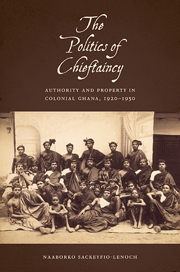Book contents
- Frontmatter
- Dedication
- Contents
- List of Illustrations
- Acknowledgments
- Abbreviations
- Introduction: Contesting Space and Authority in a Colonial Capital
- 1 Situating Ga Institutions in the European Colonial Milieu
- 2 Land Legislation, Commodification, and Effects in Accra
- 3 Negotiating Chieftaincy, the Ga Stool, and Colonial Intervention
- 4 Succession Disputes, the Ga State Council, and the Future of Chieftaincy
- 5 Contesting Property in Accra and Its Periurban Locales
- Conclusion
- Notes
- Bibliography
- Index
5 - Contesting Property in Accra and Its Periurban Locales
Published online by Cambridge University Press: 05 October 2014
- Frontmatter
- Dedication
- Contents
- List of Illustrations
- Acknowledgments
- Abbreviations
- Introduction: Contesting Space and Authority in a Colonial Capital
- 1 Situating Ga Institutions in the European Colonial Milieu
- 2 Land Legislation, Commodification, and Effects in Accra
- 3 Negotiating Chieftaincy, the Ga Stool, and Colonial Intervention
- 4 Succession Disputes, the Ga State Council, and the Future of Chieftaincy
- 5 Contesting Property in Accra and Its Periurban Locales
- Conclusion
- Notes
- Bibliography
- Index
Summary
As we saw in chapter 2, land became the subject of severe contestation from the 1890s onward. By the 1940s and early 1950s, these contestations continued but became more intense with the wave of litigation. These disputes are particularly valuable because they help us understand the variety of beliefs involved, perhaps in a manner that the evidence in chapter 2 does not allow us to see. During this period Accra experienced a wave of litigation as a consequence of the rapidly changing patterns of land control and the sharp rise in land values in urban Accra. These disputes involved litigants who were negotiating a variety of ideas and practices through the idiom of stool and family property, and they underscored the diverse, overlapping, and contradictory claims that permeated most if not all types of Accran conflicts by that time. This chapter focuses on six land cases, analyzing the sets of beliefs and practices that surfaced in these negotiations and what they tell us about this particular moment in Accra's history as well as about the politics of land in colonial Africa. The struggles to control land as property and territory provoked debates over meanings, boundaries, and belonging but were also heavily influenced by other domains of sociopolitical and economic life tied to the expanding colonial economy.
Categories of Land and Property
Land in the Gold Coast was perceived as having three aspects: the earth itself; the usufruct, or rights of occupation; and the features on the land—crops, trees, and houses—that were separate from the earth itself. All land was owned, primarily by stools, families, and individuals. Stool land was ancestral property attached to the stool. Chiefly authorities made deals involving this land only with the consent of elders and councilors. Stool land was also considered the general land of the state over which a chief exercised paramountcy.
- Type
- Chapter
- Information
- The Politics of ChieftaincyAuthority and Property in Colonial Ghana, 1920-1950, pp. 126 - 166Publisher: Boydell & BrewerPrint publication year: 2014

